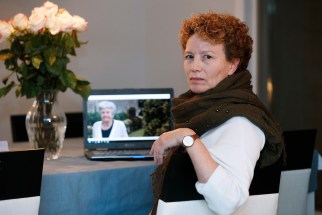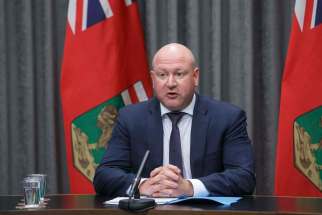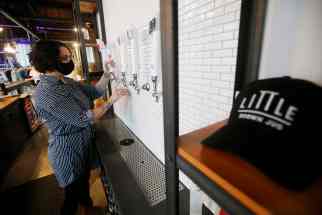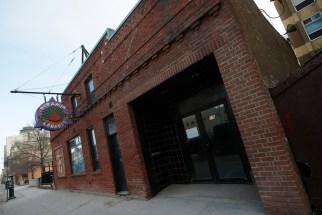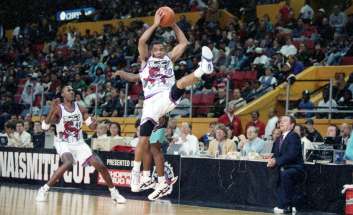Cheers and jeers: why some bars must close, others allowed to stay open
Read this article for free:
or
Already have an account? Log in here »
To continue reading, please subscribe:
Monthly Digital Subscription
$0 for the first 4 weeks*
- Enjoy unlimited reading on winnipegfreepress.com
- Read the E-Edition, our digital replica newspaper
- Access News Break, our award-winning app
- Play interactive puzzles
*No charge for 4 weeks then price increases to the regular rate of $19.00 plus GST every four weeks. Offer available to new and qualified returning subscribers only. Cancel any time.
Monthly Digital Subscription
$4.75/week*
- Enjoy unlimited reading on winnipegfreepress.com
- Read the E-Edition, our digital replica newspaper
- Access News Break, our award-winning app
- Play interactive puzzles
*Billed as $19 plus GST every four weeks. Cancel any time.
To continue reading, please subscribe:
Add Free Press access to your Brandon Sun subscription for only an additional
$1 for the first 4 weeks*
*Your next subscription payment will increase by $1.00 and you will be charged $16.99 plus GST for four weeks. After four weeks, your payment will increase to $23.99 plus GST every four weeks.
Read unlimited articles for free today:
or
Already have an account? Log in here »
Hey there, time traveller!
This article was published 20/10/2020 (1881 days ago), so information in it may no longer be current.
While customers can raise a pint at Little Brown Jug, the doors of nearby King’s Head Pub, another popular Exchange District venue, are closed.
New rules that took effect in the Winnipeg region Monday to curb the spread of COVID-19 might have some patrons scratching their heads, but the decision about which businesses have to close boils down to one thing: their liquor licence.
Types of liquor licences
For a business to serve liquor, it must have a valid service licence from the Liquor, Gaming and Cannabis Authority of Manitoba. There are six licences:
For a business to serve liquor, it must have a valid service licence from the Liquor, Gaming and Cannabis Authority of Manitoba. There are six licences:
—Dining Room
This licence authorizes the operator of a dining room to serve liquor. A kitchen must operate on site and the kitchen must be in operation at all times when the licensed premises is open. The kitchen must be stocked with sufficient food and supplies to prepare the items on the menu. Annual fee: $300
— Dining Room/ Lounge
This licence authorizes the operator of a restaurant and attached lounge to serve liquor. Businesses that hold a dining room/lounge licence have two areas within the premises – a dining room area that must follow all requirements for dining rooms, and a lounge area that is separated from the dining room area by a physical barrier. This type of licence may be issued to a standalone facility or to the operator of a hotel. Annual fee: $800
— Beverage Room
This licence authorizes a hotel to serve liquor in the areas specified on the licence. The hotel must have a minimum number of required guest rooms to qualify for this licence. Annual fee: $500
— Entertainment Facility
This licence authorizes liquor service in a business that presents at least two hours of live entertainment every day it is open. This licence may also be issued to a facility that presents musical concerts, plays, dance performances, movies, spectator sporting events, conventions, exhibitions or art displays. Annual fee: $500
— Customer/Member Service
This licence authorizes many different types of businesses to serve liquor to their customers or members. Eligible businesses include: operator of an air carrier, railway, excursion ship, intercity bus line or international airport; personal service provider, such as a hair or nail salon; facility or residence for elderly persons or for persons requiring health care or support; sports or recreational facility, golf course, curling rink, hunting or fishing lodge; hotel that does not have a dining room licence; private incorporated clubs and veteran organizations; a unit of the Canadian forces or a law enforcement agency. Annual fee: $300
— Unique Hospitality
This licence authorizes liquor service in a casino or gaming centre, or in a business that offers a unique hospitality experience that cannot be accommodated under another liquor service licence category. These special licences are not available routinely, but give the LGCA flexibility to license businesses that do not fit within other licence categories. Annual fee: $500
There are six licences and each has its own set of rules and annual fee. So when the province announced Friday that beverage rooms and entertainment facilities had to close, that meant the King’s Head, which is a live music venue, had to pull the plug since it has an entertainment facility licence.
Even though Little Brown Jug has a different type of licence — unique hospitality — general manager Chantal Hogue said Friday’s announcement was confusing. Customers didn’t know if they’d be able to visit the brewery as of Monday.
“We did want to take the time to see if there was some subsequent announcement, because they didn’t name every type of industry that would have to close or just operate at 50 per cent capacity,” she said. “Thankfully, our taproom is already closed on Mondays, so we took that day to really reach out and get the information we needed.”
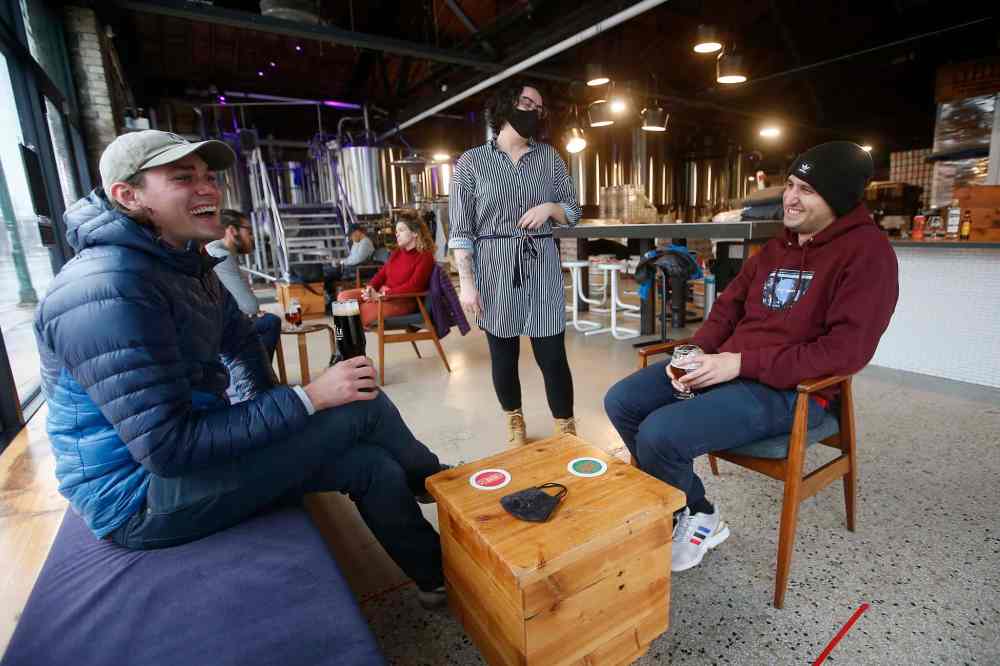
The William Avenue taproom is able to remain open at 50 per cent capacity, which is not a big change because its tables are spaced apart, Hogue said.
“I’m sure that everybody would always like a bit more information, but we’re able to operate without too many barriers, and we’re grateful for that,” she said.
On Monday, amid the confusion and anger expressed by business owners, the province switched gears and announced beverage rooms would be allowed to remain open. A beverage room licence authorizes a hotel to serve liquor. The hotel must have a minimum number of guest rooms to qualify for the licence. The change meant that Exchange District hotels such as the Woodbine and McLaren, could keep their beverage rooms open.
It made no difference to the King’s Head, which still has to stay closed for two weeks. Owner Chris Graves said he stopped offering live music because of new restrictions requiring licenced premises to not exceed 80 decibels, and it’s not possible to set up pool tables or games of darts in the building. There is, however, a full kitchen that will remain unused now.
“Because we hold the technical entertainment licence, we still can’t operate as a restaurant? That’s where the injustice is really happening right now,” he said.
The province’s shutdown targets live music venues, such as nightclubs, because patrons weren’t social distancing and virus numbers skyrocketed.
Just down the street, staff at the Peasant Cookery restaurant and bar are serving customers as usual. The business holds a dining room/lounge licence. Across the Board Café at 211 Bannatyne Ave. is also allowed to stay open and serve alcohol because it has a dining room licence.
Choosing which businesses can remain open based on their licence has created unfair situations, said Christian Stringer, owner of World Famous Palomino Club. The nightclub closed not long after “code orange” restrictions took effect in Winnipeg, because he said he “knew what was coming.”
The decision to close was a result of the requirement that no liquor be sold after 10 p.m. and customers be removed from licensed businesses by 11 p.m.
Stringer said that hurts nightclubs disproportionately.
“They changed their whole tune (Monday). We were all supposed to close down again, and then they changed it for (beverage rooms), but not us,” he said.
“We’re closed. Why? Because we don’t open till 9 p.m. or 10 p.m., we have to keep closed. The restrictions are totally different.”
A specific outline of restrictions focused on keeping people safe and providing rules customized for the unique needs of different businesses would be ideal, Stringer said.
“They’re not meant for nightclubs at all,” he said. “We’re just trying to stay alive.”
NDP Leader Wab Kinew said the province’s rollout of tightened restrictions frustrated patrons who couldn’t understand which businesses had to close.
“I think the average person is kind of scratching their head – the government’s parsing these terms like ‘beverage room,’ ‘lounge,’ ‘standalone nightclub’,” Kinew said.
“It’s a bit of a Swiss cheese of regulations in terms of what’s getting held back and what’s allowed to go ahead.”
— with files from Carol Sanders
malak.abas@freepress.mb.ca
Twitter: @malakabas_

Our newsroom depends on a growing audience of readers to power our journalism. If you are not a paid reader, please consider becoming a subscriber.
Our newsroom depends on its audience of readers to power our journalism. Thank you for your support.
History
Updated on Tuesday, October 20, 2020 8:44 PM CDT: Updates photos.



